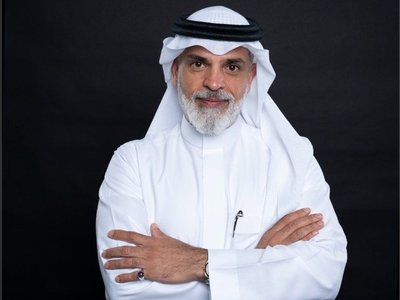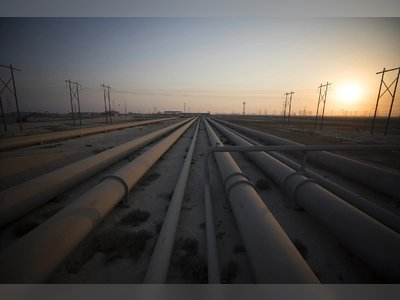
Bahraini journalist: We're looking forward to working with Israelis
“Journalists have a big impact on public opinion," the President of the Bahraini Journalists Association told The Jerusalem Post.
Ahdeya Ahmed Al-Sayed, President of the Bahraini Journalists Association, said on Thursday that she expects journalists from her country to play a very important and crucial role in promoting normalization with Israel.
She said that she and many of her colleagues were looking forward to working with Israeli journalists after Bahrain became the second Gulf state to sign a peace accord with Israel.
She also lashed out at the Palestinian Journalists Syndicate for attacking her and Bahrain over the peace treaty with Israel.“Journalism has always led public opinion,” Al-Sayed said in an exclusive interview with The Jerusalem Post.
“Journalists have a big impact on public opinion. If you are living in a country where journalists are refusing normalization and are not welcoming it, it’s going to be very challenging to convince people that this political step is something positive and that they have to look at it in a positive way.”
Al-Sayed, the first female to be elected to the 600-member Bahraini Journalists Association, won a seat for the first time for Bahrain at the International Federation of Journalists Gender Council that aims to protect and defend the rights of female journalists around the world.
Al-Sayed, who was also appointed to the board of trustees of the Dubai-based Arab Women Federation, began her journalism career at the age of 18 by working as a junior reporter for the Gulf Daily News in 1991. During the past 30 years, she continued working in the print media until she became deputy editor-in-chief of the Daily Tribune and editor-in-chief of Al-Salam.
She previously worked for Bahrain Television in English as a newsreader and later as the head of the station. In addition, she hosted weekly radio and television programs that shed light on current political issues, changes in Arab societies and women’s rights.
Since she was elected as president of the Bahraini Journalists Association, Al-Sayed has been working for the progress of women in the field of journalism by involving them in higher administrative positions. Asked how journalists in Bahrain and the United Arab Emirates have been covering the peace agreements with Israel, Al-Sayed told the Post that she “very satisfied” from what she sees and feels.
“I’m very happy and proud at the way they are covering the peace [with Israel],” she said. “Now the journalists are talking about tolerance, acceptance and respect for other religions, countries and human rights. This suddenly appeared to be a reality. I did see a few cases of journalists who refused normalization, but a few is nothing compared to hundreds of other journalists in the television, radio and print media who have supported the peace agreements.”
Al-Sayed said she was enthusiastically looking forward to cooperating with Israeli journalists and media organizations. “We need to have strong, people-to-people relations; we need to have an active role through what we write,” she added. “On the other hand, Israeli journalists need to help us achieve our goal.
We already got to meet some Israelis through virtual meetings, but there should be face-to-face interaction. Face-to-face communication is more important so we could sit together and discuss how we should coordinate things. I feel that in the next few months we will take bigger steps.”
Asked if her views reflect those of a majority of journalists in the Gulf states, Al-Sayed replied: “I can’t speak on behalf of certain countries in the Gulf. I can only speak about Bahrain and the United Arab Emirates, and I can say yes. The views of journalists in these countries are positive. Even the few negative voices that I personally interacted with in the beginning are now calming down.
I think it could have been an emotional reaction from them in the beginning because people have been told all their lives that Israel is an enemy. Of course, there are also those who have political agendas are never going to swallow the peace with Israel.”
According to Al-Sayed, the reactions of many Arab journalists to virtual meetings she’s been organizing with Israelis in the past few weeks have been very positive. “Their reactions and responses are something that I highly appreciate,” she said, adding that journalists from Saudi Arabia, Sudan and Algiers have been supportive of normalization activities with Israelis. “This shows how these journalists are embracing what Bahrain and the United Arab Emirates did and how happy they are.”
The prominent Bahraini media personality told the Post that she felt “very bad” about the reaction of the Palestinian Journalists Syndicate to the normalization agreement between Bahrain and Israel and her support for cooperation between Arab and Israeli journalists.
The Fatah-dominated Palestinian Journalists Syndicate has, over the past few years, been boycotting Israeli journalists and media organizations. The syndicate has also strongly condemned Al-Sayed and other Arab journalists for talking to Israelis.
“A journalists’ entity should be the most respectful to freedom of expression,” Al-Sayed said. “Political positions are personal stances, but the Palestinian syndicate was the first to issue a statement blacklisting me after I spoke in favor of the peace agreements with Israel.
They threatened to take me to court; they condemned me strongly. They accused me of criticizing the Palestinians. I said, no, I criticized the leaders of the Palestinians. I never offended any people, but it’s my right to express my opinion about the leaders of any organization, especially if one of the organizations is a terrorist group.”
She said that she has since refused to talk to any Palestinian media outlet that is involved with the Palestinian Journalists Syndicate. “Another Palestinian media group was very aggressive toward Bahrain,” Al-Sayed said. “They called us normalizers and enemies of humanity. It was quite disappointing to see the Palestinian reactions. I didn’t expect that from the Palestinians.”
After the attacks on her, Al-Sayed filed a complaint against Palestinian media groups with the International Federation of Journalists, but she maintains she still hasn’t received a response.
“I ignored the Palestinian attacks on me for three weeks, and I said let them have their emotional reactions, it’s ok,” she said. “But when I felt that I was being targeted I went to the international federation. The Palestinian journalists were angry because I criticized their leaders. They said that I should have come to them before attacking Palestinian leaders.”
Asked to explain the growing criticism of Palestinian leaders by many Arabs, Al-Sayed remarked: “Palestinians burned our flags on the streets. They have insulted us. When we were in school, we used to raise money to send to the Palestinians. We have the right to think and analyze. We have the right to say let’s see what the other side’s story is. Palestinian leaders are losing.
They are losing the source of income and funding that they have had for 70 years. I think that within the next couple of months, you will see the emergence of new Palestinian faces. I hate to say that, but I think the new leaders of the Palestinians will continue to represent the same ideologies. The faces will change, but the ideologies will remain the same, unless they feel that they are now being completely isolated. If the Palestinians don’t change their leaders, their losses are going to be huge.”
She said that she and many of her colleagues were looking forward to working with Israeli journalists after Bahrain became the second Gulf state to sign a peace accord with Israel.
She also lashed out at the Palestinian Journalists Syndicate for attacking her and Bahrain over the peace treaty with Israel.“Journalism has always led public opinion,” Al-Sayed said in an exclusive interview with The Jerusalem Post.
“Journalists have a big impact on public opinion. If you are living in a country where journalists are refusing normalization and are not welcoming it, it’s going to be very challenging to convince people that this political step is something positive and that they have to look at it in a positive way.”
Al-Sayed, the first female to be elected to the 600-member Bahraini Journalists Association, won a seat for the first time for Bahrain at the International Federation of Journalists Gender Council that aims to protect and defend the rights of female journalists around the world.
Al-Sayed, who was also appointed to the board of trustees of the Dubai-based Arab Women Federation, began her journalism career at the age of 18 by working as a junior reporter for the Gulf Daily News in 1991. During the past 30 years, she continued working in the print media until she became deputy editor-in-chief of the Daily Tribune and editor-in-chief of Al-Salam.
She previously worked for Bahrain Television in English as a newsreader and later as the head of the station. In addition, she hosted weekly radio and television programs that shed light on current political issues, changes in Arab societies and women’s rights.
Since she was elected as president of the Bahraini Journalists Association, Al-Sayed has been working for the progress of women in the field of journalism by involving them in higher administrative positions. Asked how journalists in Bahrain and the United Arab Emirates have been covering the peace agreements with Israel, Al-Sayed told the Post that she “very satisfied” from what she sees and feels.
“I’m very happy and proud at the way they are covering the peace [with Israel],” she said. “Now the journalists are talking about tolerance, acceptance and respect for other religions, countries and human rights. This suddenly appeared to be a reality. I did see a few cases of journalists who refused normalization, but a few is nothing compared to hundreds of other journalists in the television, radio and print media who have supported the peace agreements.”
Al-Sayed said she was enthusiastically looking forward to cooperating with Israeli journalists and media organizations. “We need to have strong, people-to-people relations; we need to have an active role through what we write,” she added. “On the other hand, Israeli journalists need to help us achieve our goal.
We already got to meet some Israelis through virtual meetings, but there should be face-to-face interaction. Face-to-face communication is more important so we could sit together and discuss how we should coordinate things. I feel that in the next few months we will take bigger steps.”
Asked if her views reflect those of a majority of journalists in the Gulf states, Al-Sayed replied: “I can’t speak on behalf of certain countries in the Gulf. I can only speak about Bahrain and the United Arab Emirates, and I can say yes. The views of journalists in these countries are positive. Even the few negative voices that I personally interacted with in the beginning are now calming down.
I think it could have been an emotional reaction from them in the beginning because people have been told all their lives that Israel is an enemy. Of course, there are also those who have political agendas are never going to swallow the peace with Israel.”
According to Al-Sayed, the reactions of many Arab journalists to virtual meetings she’s been organizing with Israelis in the past few weeks have been very positive. “Their reactions and responses are something that I highly appreciate,” she said, adding that journalists from Saudi Arabia, Sudan and Algiers have been supportive of normalization activities with Israelis. “This shows how these journalists are embracing what Bahrain and the United Arab Emirates did and how happy they are.”
The prominent Bahraini media personality told the Post that she felt “very bad” about the reaction of the Palestinian Journalists Syndicate to the normalization agreement between Bahrain and Israel and her support for cooperation between Arab and Israeli journalists.
The Fatah-dominated Palestinian Journalists Syndicate has, over the past few years, been boycotting Israeli journalists and media organizations. The syndicate has also strongly condemned Al-Sayed and other Arab journalists for talking to Israelis.
“A journalists’ entity should be the most respectful to freedom of expression,” Al-Sayed said. “Political positions are personal stances, but the Palestinian syndicate was the first to issue a statement blacklisting me after I spoke in favor of the peace agreements with Israel.
They threatened to take me to court; they condemned me strongly. They accused me of criticizing the Palestinians. I said, no, I criticized the leaders of the Palestinians. I never offended any people, but it’s my right to express my opinion about the leaders of any organization, especially if one of the organizations is a terrorist group.”
She said that she has since refused to talk to any Palestinian media outlet that is involved with the Palestinian Journalists Syndicate. “Another Palestinian media group was very aggressive toward Bahrain,” Al-Sayed said. “They called us normalizers and enemies of humanity. It was quite disappointing to see the Palestinian reactions. I didn’t expect that from the Palestinians.”
After the attacks on her, Al-Sayed filed a complaint against Palestinian media groups with the International Federation of Journalists, but she maintains she still hasn’t received a response.
“I ignored the Palestinian attacks on me for three weeks, and I said let them have their emotional reactions, it’s ok,” she said. “But when I felt that I was being targeted I went to the international federation. The Palestinian journalists were angry because I criticized their leaders. They said that I should have come to them before attacking Palestinian leaders.”
Asked to explain the growing criticism of Palestinian leaders by many Arabs, Al-Sayed remarked: “Palestinians burned our flags on the streets. They have insulted us. When we were in school, we used to raise money to send to the Palestinians. We have the right to think and analyze. We have the right to say let’s see what the other side’s story is. Palestinian leaders are losing.
They are losing the source of income and funding that they have had for 70 years. I think that within the next couple of months, you will see the emergence of new Palestinian faces. I hate to say that, but I think the new leaders of the Palestinians will continue to represent the same ideologies. The faces will change, but the ideologies will remain the same, unless they feel that they are now being completely isolated. If the Palestinians don’t change their leaders, their losses are going to be huge.”


